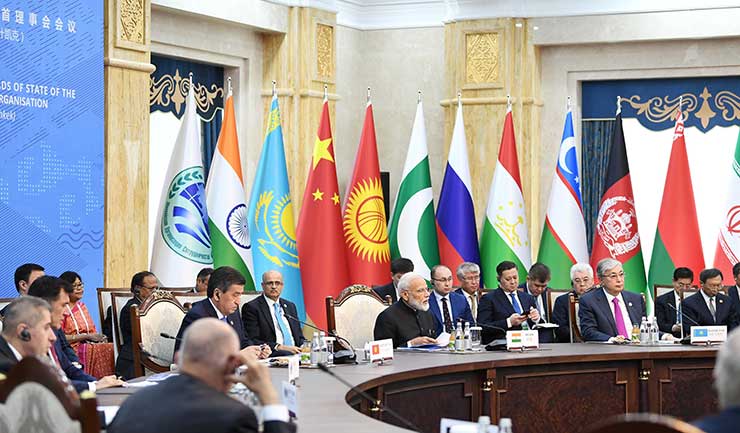
The presence of India and Prime Minister Narendra Modi was clearly felt by the global leaders in two days Shanghai Cooperation Organisation (SCO) Summit 2019. After the re-election it was first multi-lateral summit where Modi Government clearly indicated his strong foreign policy maintaining the sovereignty of the country.
In the 19th SCO Summit, the leaders of eight full-fledged members including China & Russia and other Central Asian countries discussed on various issues in Bishkek, Kyrgyzstan on June 13 and 14 and concluded with focused outcome. On the sidelines of SCO Summit, PM Modi had bilateral meetings with Chinese President Xi Jinping and Russian President Vladimir Putin on day one. In both the meetings, talks were held to improve the economic, cultural and bilateral relations with the two countries.
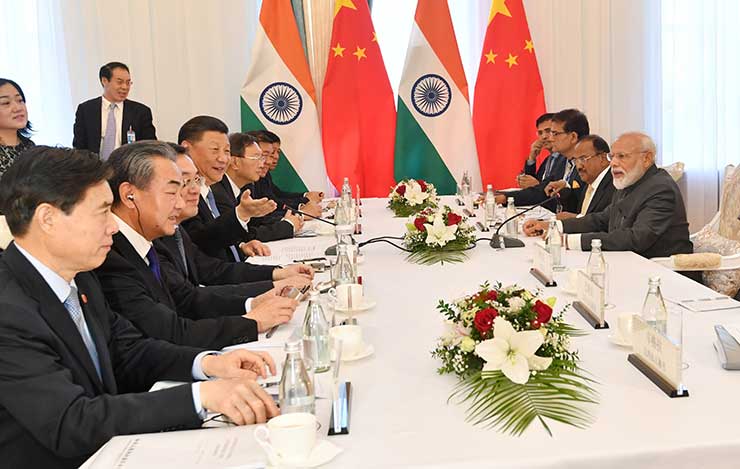
While different countries had different approach in the SCO Summit, there were reports of Pakistan PM Imran Khan breaking the diplomatic protocol at the opening ceremony, being seated while everyone else were standing to welcome the dignitaries entering the hall. There were reports of pleasantries exchanged between Mr Modi and Mr Khan, however those were very casual and not good enough to portray any improvement in the relationship between the two countries. There were no meetings or talks between both the leaders of two nations. Prime Minister Modi had his plenary session of the SCO Summit on day two presenting his views and India’s stand on various issues. Few updates on the issues discussed in SCO Summit and India’s stand on those issues are as under:-
CO-operation against global terrorism
The member countries had a consensus on the issue and they urged the international community to strengthen the United Nations Charter and principles of international law without any double standard and respecting each-other’s sovereignty. They also had a consensus regarding the adoption of the Comprehensive Convention on International Terrorism. The members supported the effort of Afghanistan government for restoring peace in the region. Syria situation to be resolved through dialogue maintaining Syria’s sovereignty and independence. India stood for a terrorism free society and PM Modi called for an international conference on the challenges faced to combat terrorism.
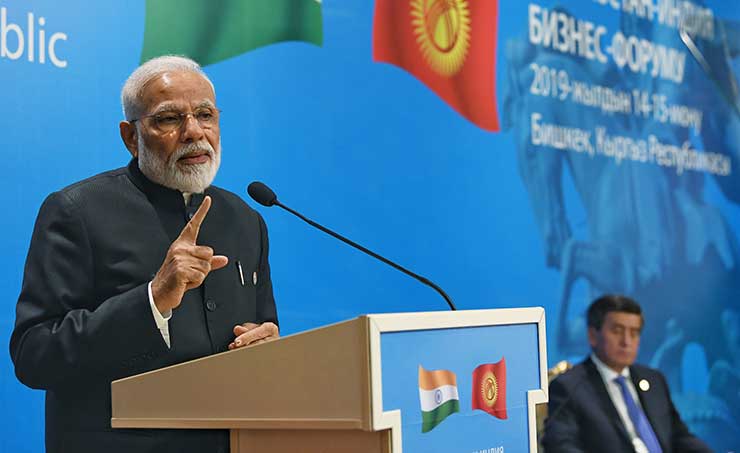
In his speech PM Modi though did not mention the name of Pakistan, but categorically said -“Countries that sponsor, aid and fund terrorism must be held accountable.” In his bilateral talk with Xi Jinping, Mr Modi firmly mentioned that Pakistan is yet to take any concrete action to create a terror free atmosphere and it is necessary to facilitate forging ties between India and Pakistan.
Economy and Trade
The member countries agreed to increase their cooperation and participation in trade, finance, investment, innovation and technology. While during the on-going trade war between the US and China, PM Modi mentioned: “We need a rule-based, transparent, anti-discriminatory, open and all inclusive WTO-centred multilateral trading system focused so that the interests of every countries specially the developing ones can be taken care of,”
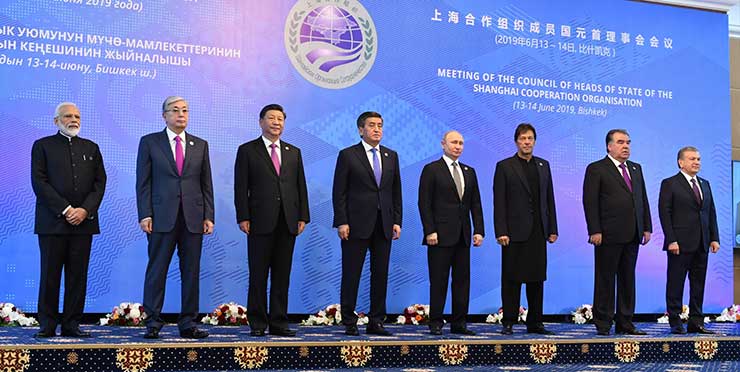
Connectivity and Road Projects
Though in his speech PM Modi highlighted the importance of connectivity, however, he refused to endorse China’s connectivity programme. In Bishkek declaration, six-member backed China’s infrastructural Belt & Road Initiative (BRI) without naming China, PM Modi maintained that such initiatives must be based on “respect for sovereignty, regional integrity, good governance, transparency…and reliability”. To mention, India has protested BRI because the China-Pakistan Economic Corridor (CPEC) passes through Pakistan occupied Kashmir (PoK). However significantly Chinese President Xi Jinping told Prime Minister Narendra Modi on June 13 that India and China “do not pose threats” to each other.
India-Kyrgyz Business Forum
On the sideline of SCO Summit, in Bishkek, Prime Minister Modi and Kyrgyz President Sooronbay Jeenbekov jointly addressed the India-Kyrgyz Business Forum which is an endeavour to promote the commercial linkages between the two nations. PM Modi announced the USD 200 million lines of credit for Kyrgyzstan and said the two sides have decided to upgrade their strategic ties to a partnership level. Both the countries have prepared a five-year roadmap to increase the bilateral trade. The two countries shared views on several issues and they have signed 15 agreements, including on the Double Taxation Avoidance Agreement (DTAA), Bilateral Investment Treaty (BIT), and MoUs in the field of Health, Security, Defence and Information and Communication Technology.
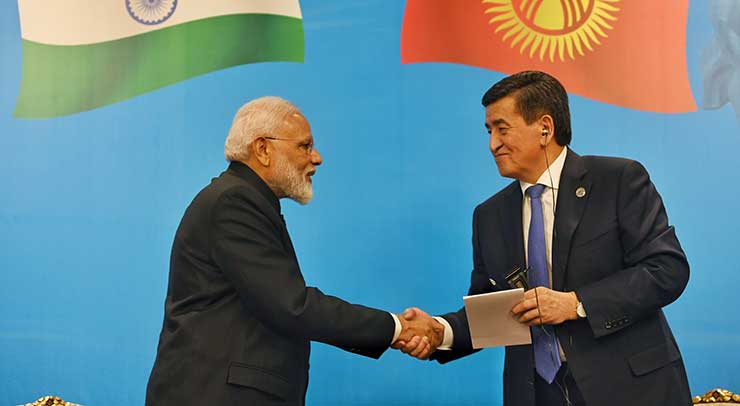
In this SCO Summit, Prime Minister Narendra Modi met president of Kazakhstan Kassym-Jomart Tokayev on June 14 and also held bilateral meeting with Iranian President Hassan Rouhani. PM Narendra modi also had a ‘pull-aside’ meeting with President Alexander Lukashenko of Belarus and President Khaltmaagiin Battulga of Mongolia.
On the way forward to SCO Summit 2019, it was announced that Russian Federation will host a regular SCO Heads of State Council Meeting. For India, the Summit seemed to be the beginning of better ties and co-operation with the global powers. There will be a Russia-India-China (RIC) trilateral meeting on the sidelines of the G-20 Summit in Osaka, Japan on June 28- 29 this year. Russian President Vladimir Putin invited PM Modi to be the main guest at Eastern Economic Forum in Vladivostok, Russia in early September, and Mr Modi has accepted the invitation. The two-day visit in SCO Summit 2019 was packed with bilateral meetings, discussions and ties. It is very much apparent that PM Modi has started his journey to conquer the world with SCO Summit 2019 and it is just a new beginning for the newly re-elected Modi government.
-The author is a Strategic Affairs and Central Asia expert








